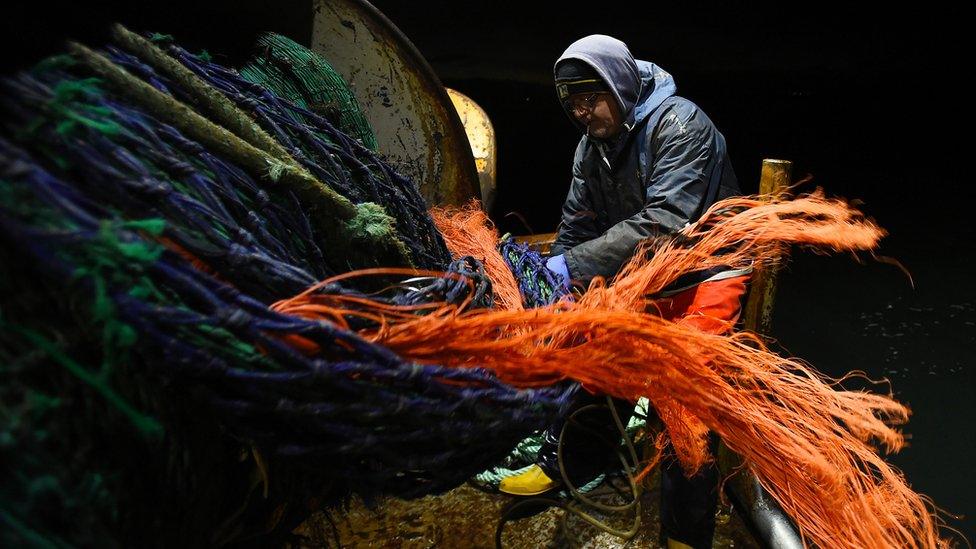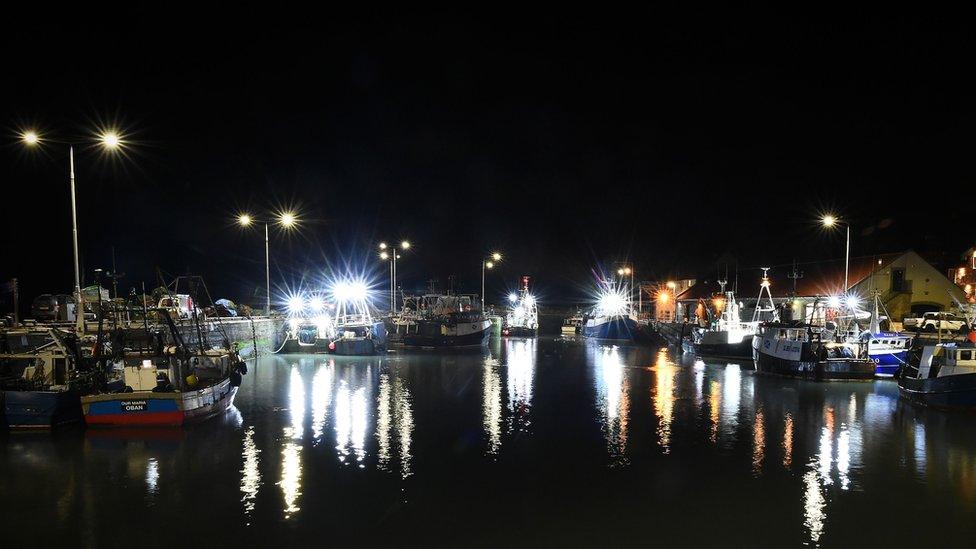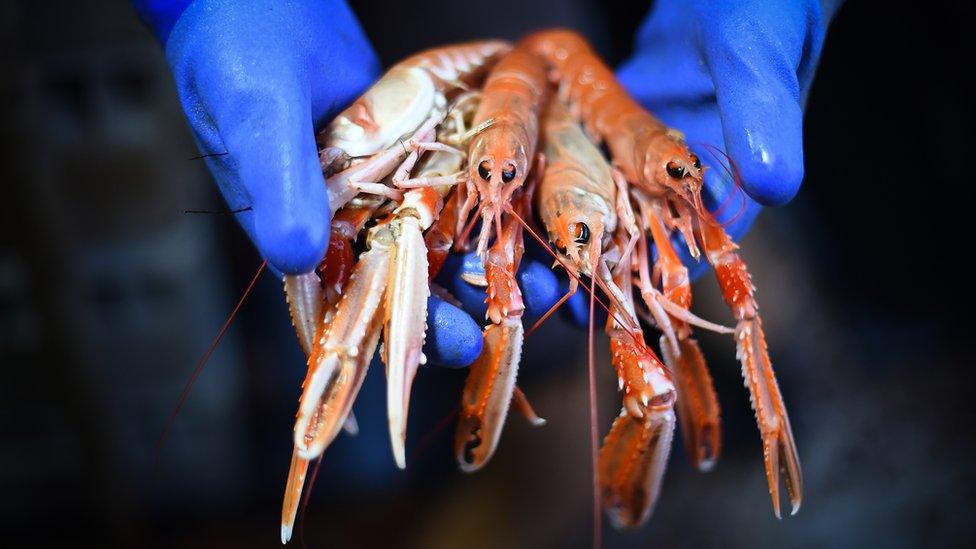Battle lines being drawn over fishing rights
- Published

Fishing is a concern for the inshore fleet as well as the larger boats
Naval battle lines are being drawn up ahead of talks between the European Union and UK, with fisheries among the most difficult and high profile topics where the two sides diverge
This week has seen negotiating mandates set out - with one side wanting little change and the other side wanting a radical re-drawing of 40 years of managing the industry. Brussels' muscle is the threat of closing off access to markets
While much of the attention is on the interests of larger boats, the concerns of the inshore fleet are different. Along with fish processors, they want to ensure they can still sell, easily and without tariffs, to France and Spain
Fish have been served up among the main bones of contention between the UK government and the European Union.
The negotiating mandate published on Thursday at Westminster is a long way from the vision for a future relationship for managing wild fish stocks in the European Commission's proposals.
That comes as no surprise to those who have seen the pre-negotiation posturing - from the rhetoric of the 2016 Brexit campaign, to the priorities set out by Brussels along with the Withdrawal Agreement.
The industry does not matter nearly as much as car manufacturing or finance. In employment terms, traditional fishing represents less than 1% of the UK economy, and little more than that in Scotland.
However, it is of totemic importance to coastal communities and to the governments that represent them. Brexiteers played on dislike of the Common Fisheries Policy, making claims of the harm it did since 1973.
In negotiations to join, one telling Whitehall internal discussion saw fisheries described as "expendable" alongside other priorities. That treatment has been a powerful way of boosting hostility to the EU from Shetland and north-east Scotland to Cornwall.

Fishing is important to the coastal communities in Scotland and the rest of the UK
However, other parts of the fishing industry are concerned that their access to European markets will suffer in the looming negotiations, including creel fishing and food processing.
On Wednesday in the Scottish Parliament, Fergus Ewing, the cabinet secretary responsible for fisheries (and much else besides), set out means of getting the inshore fleet to get along better, resolving disputes over gear and putting less plastic in the water. He also set out how significant that sector is:
80% of Scotland's 2,000 registered fishing vessels operate in inshore waters
Of those 1,600 boats, most are micro-businesses going after prawns, langoustine, lobster and scallops
Much of the catch is heading for export markets in France, Spain and Italy: in 2018, £100m-worth of langoustines were exported from the UK
Two-thirds of the world's langoustines are sourced in Scotland, he said, mostly destined for France, Spain and Italy
Much of that catch is trucked, fresh or even live, to continental markets. The sector fears health certificates will be required, adding to delay and cost. And trucks could be stuck in bottlenecks at Channel ports, each one with diminishing value to its cargo as it does so.
Meanwhile, Spain, France and the continuing EU members around the North Sea have ensured the industry has a special status in the EU negotiating mandate. Even though many other countries have no coast let alone a fishing fleet, they have signed up to this.
So this week, the two sides crystallised their positions. On Tuesday, Michel Barnier, the EU's chief negotiator, put fisheries in the context of the free trade deal he wants to secure.
The mandate emphasises the scarcity of fish and the need to manage stocks responsibly, and the sharing of data and research. On that, there's no disagreement - though both sides saying they'll look to scientific advice overlooks the track record of the Common Fisheries Policy. It routinely bends its way round that advice for reasons of political expediency and governments rarely complain about that.

About 1,600 boats in Scotland operate in inshore waters going after prawns, langoustine, lobster and scallops
The EU then wants "to uphold existing reciprocal access conditions, quota shares and the traditional activity of the EU fleet". Note that includes the lesser amount of catch by UK boats from neighbouring countries' waters.
Monsieur Barnier proposes that quota shares should only be adjustable with the consent of both the UK and EU. He wants a long-term management deal, with transfers and exchanges of quotas. The EU side wants joint control and inspection to ensure equality of treatment and compliance between different fleets.
In short, Brussels and its member states want to see very little change, and no unilateral UK right to vary from the status quo. And the leverage? "The terms on access shall guide the conditions set out in other aspects of the economic part of the envisaged partnership". That is: access to EU markets.
Where both sides are agreed again is on the pressure to get a deal by this summer, so that a new system for negotiating annual catch quotas can be in place in plenty time for the traditional pre-Christmas middle-of-the-night deal.
If there's no such deal, the UK can dust down plans it drew up last year for a sharp and expensive increase in patrol boats and aircraft to keep out all EU fishers.
'Relative stability'
And what does the UK government want? The first obstacle to a deal is that it puts fisheries at the top of a section in the negotiating mandate, called "Other Agreements". Along with aviation, the Whitehall intention is to separate fish catch in UK waters from fish sales in EU markets: "Trade in fisheries products should be covered by the Comprehensive Free Trade Agreement".
In place of long term management, the British proposal is for annual negotiations, similar to those with Norway. And Britain would, from 2021 onwards, negotiate a share-out of northern North Sea quotas directly with Norway.
There's a rejection of "relative stability" - the Common Fisheries Policy jargon for maintaining national shares on the historic basis as they stood in the 1970s. Following the approach taken to the share-out with Norway, the British will talk of "zonal attachment". This is about allowing fishers to follow where the fish live, acknowledging that shoals don't recognise sea boundaries.
EU boats licensed to fish in UK waters would have to comply with UK rules. "The UK is open to providing for the creation of a forum for co-operation on wider fisheries matters... such as data-sharing, science, control and enforcement". There would be an agreed mid-way of settling disputes, and a right to suspend the licensing agreement.
An important added sentence for Holyrood consumption: "The UK government recognises the interests of the devolved administrations in this area, and is committed to working with them in the consideration of any agreement."
That wording is a long way from willingness to compromise with diverging Scottish government priorities, even though Scotland has most of the UK catching fleet.
So this week we got the starting points, with room for some agreement, but far more potential for fisheries to be a source of tension through the talks on the future and long-term relationship.
How can the two positions be reconciled? By one side giving ground, of course. That might be achieved by a method often used in negotiations that involve the European Union - phasing in change over enough time that it softens the blow of unwelcome change.
